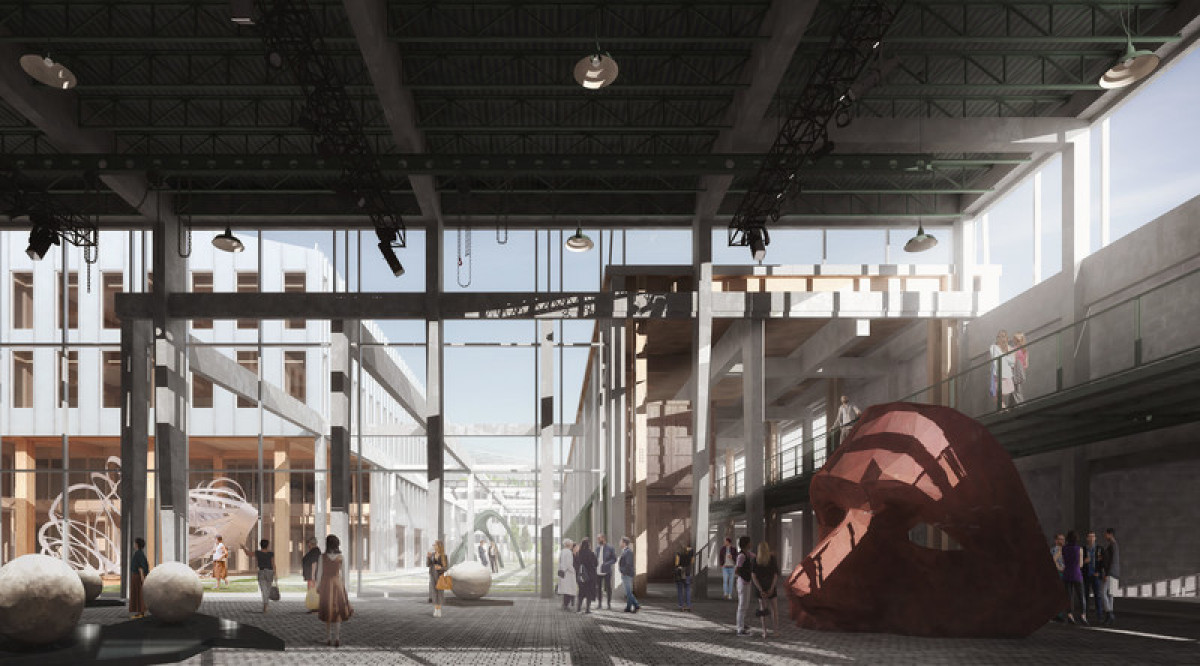07 Oct 2021

The multidisciplinary team comprised of Sid Lee Architecture, Ateliers Créatifs Montréal, Collectif Récolte, and The Centre for Sustainable Development, is proud to announce that Les Ateliers Cabot is the winning project of the 2nd edition of C40 Réinventer Montréal.
Reinventing Cities is a call for projects launched by C40 that aim to encourage carbon neutral urban regeneration and to implement the most innovative ideas for transforming underutilized sites into hotspots of highly sustainable development and resilience, and to serve as a model for future developments.
Les Ateliers Cabot is a place of research, creation, and development; a multifunctional site housing artists’ studios (exhibition, presentation, and event spaces), office space, an industrial and technological incubator, facilities dedicated to food production and distribution, and businesses committed to the pooling and circularity of resources, all operating within a large urban green space.
Les Ateliers Cabot is the genesis of the collective dream of providing non-profit organizations with access to property that provides them with the means for honouring their missions for their community. The project presents a development model anchored in the core of the social and circular economy. The visionaries of the project are comprised of a group of individuals which is supported by a community development NPO comprised of Sid Lee Architecture, Ateliers Créatifs Montréal, the Collectif Récolte, and The Centre for Sustainable Development – with additional members to be added from among the occupants, tenants, owners, and operators of the project. The model also proposes to make 4000 Saint-Patrick a land trust that protects and ensures the permanency of the C40 objectives. In the context of a health crisis, where the most vulnerable populations have incurred the greatest costs, this type of model is a safety net for, and at the service of, citizens.
This approach rebalances traditional development objectives, swapping economic profitability in lieu of the benefits derived from the moral pact between man and the planet.
Les Ateliers Cabot is in the spirit of mininal impact, where the essence of the location is preserved by acting only where it is imperative to do so "mutatis mutandis". This is achieved by recycling, restoring, and reaffirming the industrial soul of the Canadian Power Boat Corporation site - a location built for warship building and connectivity to the city’s transport canals.
Les Ateliers Cabot revolves around water as a historic element to be commemorated, and as a natural resource to be placed at the heart of its landscape and environmental strategy. It is a whole system of valleys, marshes, and basins, with seasonal fluctuations that liven up the site, and presents the possibility to reconnect two major biodiversity corridors of the Aqueduct Canal and the Lachine Canal. The architecture blends into its simplicity, allowing flora and fauna to regain control over the built environment (inspired by Gilles Clément's concept of the third landscape). The site thus acts as a link between man and nature, at a perfect junction between its outlying districts.
Following the requirements of the C40 competition, Les Ateliers Cabot aims to achieve operational carbon neutrality and significantly reduce its intrinsic carbon footprint. This will be achieved using creative low-carbon solutions that can be reproduced on a city-wide scale (e.g.: the energy loop between buildings, the use of wooden structures, the Bicycles Cannibal, the RécoltePool shuttle, the revalorized products from the Quebec startup StillGood, the kickoff prototype for organic photovoltaic membranes from Brilliant Matters, and much more). The collaborative integrated design process between team members (despite COVID-19) predisposed the project to exemplary resilience and sustainability - both environmentally, socially, and economically.
The team has already returned to work to ensure delivery on its commitments and to dive into the next year of due diligence.
A socio-financing campaign will open the project to as many people as possible, with contributions that correspond to the individual and collective capacities of the communities of the Greater Montreal region.
In short, here are the commendable environmental performance indicators selected by the C40 Reinventing Cities team:
Professional credits
Principal experts involved:
Sid Lee Architecture : Urban Design and architecture
Arup: Expert – Sustainable development and multiple engineering disciplines: structural, civil, water management, microclimate, and transport
Akonovia: Expert - Energy efficiency, sustainable building, and efficient systems
Rousseau Lefebvre: Expert – Landscaping and biodiversity
Other collaborators (in alphabetical order):
Aquartis: Expert – Water recycling technology
Brilliant Matters: Incubator – Green technologies (photovoltaic panels)
Centre PHI (PHI Muse): NPO - Designer and distributor of artistic projects
Fondaction: Potential investor
Gehl – Making Cities for People: Expert - Urban designer and researcher
Grand Potager: NPO - Urban nursery operator
Groupe C. Laganière : Expert – Environmental soil rehabilitation
Inerjys: Capital venture – Green technologies
Local Logic: Expert – Artificial Intelligence in urban characterization
Ma Bicyclette: Expert – Bike rental and repair workshop near the Lachine Canal
MASSIVart: Expert - Art and culture
OSMO Foundation: NPO – Campus Notman (startup incubator, technology sector)
Pro-Vert Sud-Ouest: NPO - Quality of life of citizens and the environmental health of the South West
Still Good: Incubator – Circular economy et zero waste (organic matter)
Regroupement des arts de rue du Québec: NPO - Representing and promoting Quebec Street Arts at the provincial, national, and international levels.
UNESCO Chair in Urban Landscapes of the University of Montreal: UNESCO Chair - Research, education, and international dissemination in urban landscapes